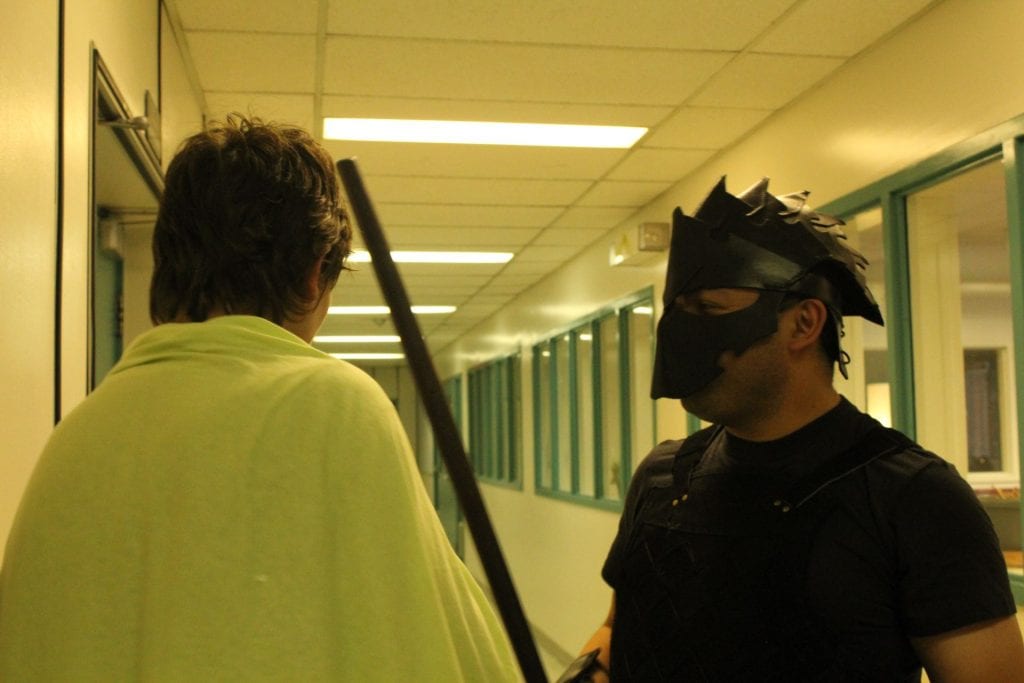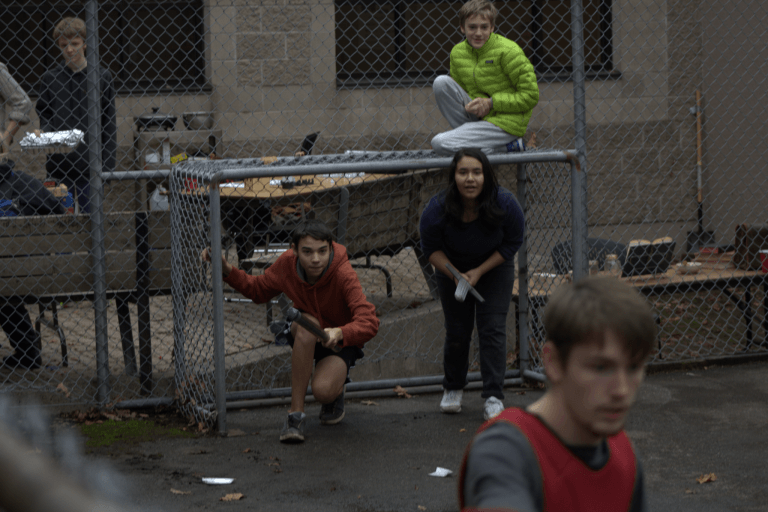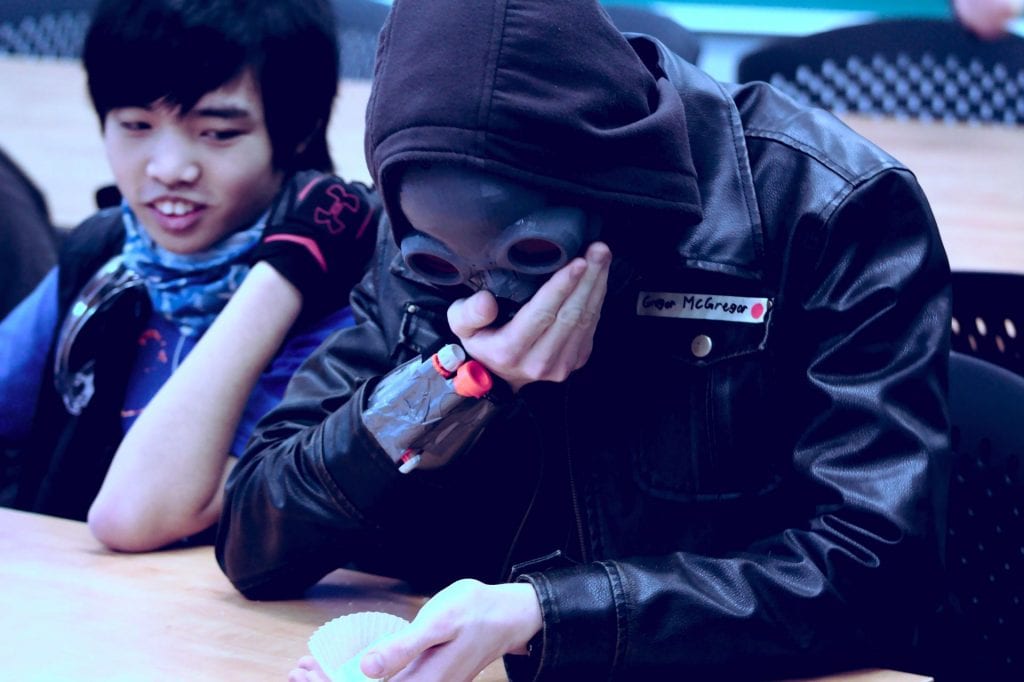Why DREAM?
Back in 2015, students asked us to change the Inquiry Hub motto to Dream Create Learn (asked is perhaps a bit of a fib; they rather sort of did it themselves). A lot of the staff pushed against this change, seeing Dream as sending rather the wrong message for a new sort of school based around self-scheduled learning. But as tends to happen at iHub, the students had their way, and Dream became the most important part of our branding.
This was all prior to students seeing a talk by Seth Godin, an American marketer and teacher, and his cautioning of the American education system, and systems similar, to stop stealing the dreams of young people; to stop encouraging sameness and discouraging outliers. This was before any of them had even heard of his manifesto.
There’s a rarely asked question that’s core to Seth’s manifesto: “What is school for?” At Inquiry Hub, our goal has become to guide students to make their Dreams come to life. That’s our function. We want students to Dream, innovate, and invent. Only when they have a Dream can they think about what to Create and what they Learn from the process.
There is a very noticeable difference when students work on a teacher’s proposed project versus one where the students take ownership. Student-powered projects have a better completion rate, the product is more interesting, and more effort is voluntarily exerted. By designing a school around students’ creative ideas, we also cultivate leadership, collaboration, confidence, and all of the skills that are increasingly valued by society. The cost is less rote memorization, less compliant behaviour, more questioning, decreased efficiency, etc. None of which has to be seen as a problem.
We believe that our students will be able to make their own failure/success in the future because they are practising right now.
What do teachers do when students lead?
At Inquiry Hub, we make a big deal about our student-powered projects. Most ideas turn out better in practice when students take the lead and teachers play a different role than in a traditional classroom. The students own the project and they have their own reasons for completing it (beyond getting a grade).
Take, for example, the video created by students to start our 2018 open house. John Sarte, a teacher, consulted on the project and acquired necessary equipment, but then left the students to do everything else. The students working on it developed the concept, drawing upon various sources in popular culture and previous projects by their peers. Fixing their minds upon a spoken word poem mixed with an original song, one student wrote a few experimental lines to start, then the rest worked to expand, improve, and develop those lyrics into four verses. Two other students worked together to create the musical composition of the piece, one writing and performing the refrain, the other writing and arranging the instrumentation. Two more choreographed and performed short dances to each chorus. Students spent more than thirty hours filming all the segments and recording the spoken word and sung-through lyrics. Finally, they mixed the track and edited the video together.
Although a key element of Inquiry Hub is the invitation for students to lead, teachers actually do very important, very useful things. In 2016, John Sarte suggested to a few students the idea of producing a live action role play or larp. Several students immediately said yes and spent the next three months tossing ideas around and learning about larps—tinkering with story, trying out different characters, and testing potential game mechanics. It was a messy process with no blueprint to follow. So how did the students make it work?
What you need to know about our school is that projects, like larp, are led by students.
Inquiry Hub prefers to think of every learner as a protagonist, a hero facing the challenge of creating something new and different. Thus, the task of making their dream a reality is the reason to discover and hone their abilities. In this case, their ability to design a live action role play. To that end, just like in every good story, the hero needs a guide to encourage and challenge them. That’s the role of an iHub teacher.
John Sarte checked to see if the students were making progress in the larp planning. He provided guidance to get passed several stumbling blocks, such as how to agree on a story. He encouraged them to make a trailer and promote the activity to the school with quick tutorials on costuming, combat, and spell-casting. He also organized a foam-smithing workshop and recruited an instructor to teach swordplay. Knowing nothing about larps before hand, the teacher learned a lot about the topic alongside the students.
When the larp took place, the teacher was an NPC (non-player character), running around with the students and setting them on quests. And when the students needed a new story line, that teacher was prepared to sacrifice his character, a lovable merchant named Hobin, so their game could go on.
Like in other schools, iHub teachers set up classes and lessons and communicate with students and their families. We assign and collect homework and supervise tests. We offer feedback, advice when needed, and help to organize time and resources. But most importantly, we participate in the creative community to help make student ideas come to life.
Since that first larp in 2016, we created four more and have elaborated on character creation, game mechanics, and even introduced currency. Creating larps led to offering Directing and Script-writing and in the future we will have a dedicated Game Design course.
Just as you can’t have a school without students, you can’t have Inquiry Hub without teachers. Our teachers recognize the strengths and weaknesses of our diverse community. As experienced learners, we guide students toward their greatest opportunities for success. At our school, students and teachers work together to create and learn new skills. We collaborate to do better, to invent, and to innovate.
Making student ideas come to life
Inquiry Hub is a different kind of school because one of our core purposes is to provide a supportive, caring, creative community that helps students make their ideas come to life. DCL time, a network of mentors, and access to resources and equipment always serves the ideal of inspiring students to make, create, or innovate their idea.
At Inquiry Hub, the aspirations of the students help shape the school. We find that our students are quite interested in creative endeavours, such as writing, art, and film-making. However, they are also fascinated by science, computer programming, and other high-tech creations. Regardless of whether a learner leans towards art or science, or a mix of both as often happens, we strongly encourage every individual to create something new and innovative that they themselves can be passionate about.
Many’s the time one will see a wild look of joy in the eyes of a student as they talk about what they’re working on or what they’ll work on next. It’s something beautiful, yet we see it so often at iHub. Sophie, speaking of their dream of starting a restaurant and how they’re setting up a stall in a farmers market; Alex, talking about his Land Cruiser repairs and the work he still has to do; Liam, thinking of his film adaptation of A Comedy of Errors; Senn, speaking of the feature length musical she plans to debut in her final year. They’re all chasing their dreams; they’re all achieving them. Not just grades or graduation, but their real, actual passions.
It’s impossible to fully communicate the breadth and sheer number of inquiries that iHub students do… But let’s try our best:
How far would you go?
As a tiny little programme of choice, Inquiry Hub still isn’t that well known. So in 2017, students started work on an idea to visit each of SD43 Coquitlam’s fourteen middle schools to promote iHub to the students there, calling it iHub Roadshow. They organised each and every show, from where and when they were going, to which students were presenting and what on, with teachers serving as chauffeurs. And, just like every event from iHub, students set about writing, filming, and editing original videos to complement the presentations and performances in just the right way.
Two of the videos would appear between presentations to break up the monotony and keep middle schoolers interested. These videos looked at various inquiry projects in two general fields: STEM and Fine Arts. But the first video, the cold open set before the student MC had even introduced the show… that would have to be something special.
Not a single student attends Inquiry Hub by default; they all have to choose us. Given that our programme is so small and remote, and a little bit different from what people are used to, it’s always a bit of a daunting choice for family’s considering us. Any reason, from the distance a student would have to travel, to the friends they’d have to leave behind, to the innovative style of learning could be a barrier to someone who’d be really wonderful at iHub attending.
So, in one minute and eighteen seconds, students asked the question “How far would you go?” How far would you go for the education that’s right for you? For your future, for your passions, for what you’re good at and what you want to have talent in? For dreaming, for creating, for learning?
What is DCL time?
Our most unique feature at iHub is Dream Create Learn time (DCL). Named for the student-created murals in our garden, DCL is a time when individuals are encouraged and supported to pursue their interests and share their learning with their community within a high school setting where the traditional structure and control of block scheduling would not permit such an extensive time commitment. DCL is our response to the notion of student-centred learning and personalization. Rather than catering to each student as a consumer of educational services, DCL assumes that students deserve opportunities to determine their educational experiences in balance with the demands of the teacher who facilitates students’ learning with respect to prescribed curriculum, graduation requirements, and workplace and post-secondary expectations.
DCL is used to work on:
1) Courses (online assignments, project work, etc.);
2) Student-led inquiry or Independent Directed Studies work; and
3) Reflections where students curate a personal digital portfolio and comment on their learning in conversation with a teacher or peers or posting to their blogs.
DCL allows students to create or build something they themselves want, such as a song, a novel, or an app. Ultimately, Dream Create Learn is more descriptive for what students do with their time and it also reflects the degree of freedom students have in directing their work.
What is Inquiry Hub?
Inquiry Hub (iHub) is designed and developed as a program of choice in School District 43. Students must apply to attend the school. iHub serves about 70 students in grades nine through twelve. It offers a full British Columbia high school graduation program.
As a contribution to the education system, Inquiry Hub is a school vision and collection of practices developed in accordance with the regulations and expectations of the BC public school system. Moreover, it is a model or platform for other schools to adapt to their own unique context. We believe that students are intrinsically motivated to lead projects of their own design and choosing, especially when they have the time, resources, and support of a community. One of iHub’s fundamental tenets is that learning occurs in a context where individuals feel safe and valued and there are allies and mentors to help with the work. We believe that students do not need to wait until after graduation in order to make a difference in the world.
We provide time, resources, and structure to help individuals successfully complete and learn from their projects. This is accomplished through Foundations of Inquiry 10 and 11—two Board Authority Approved courses we developed for iHub. These courses focus on the process of inquiry, developing questions, consulting with experts, documenting progress, and sharing milestones. These courses prepare students to plan Independent Directed Studies (IDS) for subsequent years.
In an IDS, students study an area of interest in-depth with minimal instructional time. A teacher provides the student with guidance for their IDS but, significantly, the learning occurs with mentors, peers, and a collection of resources found online and outside of school. Between 30 and 50% of a student’s weekly schedule is available to work on inquiry projects with which they can earn credits toward graduation.


